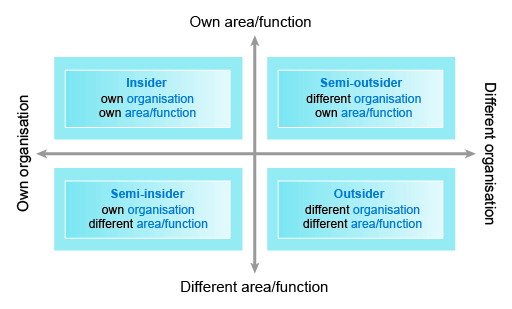1 Becoming a practitioner-researcher
When researching an aspect of an organisation – in this case to make change – you can think about your role in relation to this research. In this case, you can call yourself a ‘practitioner-researcher’, due to the fact that you are working within the organisational context [Tip: hold Ctrl and click a link to open it in a new tab. (Hide tip)] in which you would like to make a change.
Different types of practitioner-researcher can be categorised according to their relationship with the location or context of their project as shown in Figure 1. There is no ‘right’ place to be located in the figure; it is more important to consider the implications of the positioning when planning and conducting an organisational change (Tietze, 2012).
Starting in the bottom right-hand corner, the practitioner-researcher as ‘outsider’ reflects the position of many academic researchers. Typically, academic researchers must negotiate access to an organisation if they wish to conduct empirical research. At the other end of the spectrum to the academic as an ‘outsider’ is the ‘insider’. Here, individuals undertake research on their own areas of work, with those they work with on a day-to-day basis.
Between these two positions are those of the ‘semi-insider’ and ‘semi-outsider’. A practitioner as a ‘semi-insider’ is still conducting a project in their own organisation, but not with their direct work team or function – for example, a practitioner who works in one department of an organisation but undertakes a project in another department to examine factors impacting organisational aspects.
A practitioner as a ‘semi-outsider’ is one who is investigating their own area of work but in a different organisational context. An example would be, when a person working in a business function conducts a survey of other professionals in different organisations about an issue related to the business practice.
Each different position encompasses different challenges and opportunities at the various stages of the project. Anderson (2009) provides a related perspective which is that of the ‘practitioner-researcher’ who undertakes their project alongside their day-to-day job. Table 1 shows the advantages and disadvantages of this position.
| Advantages | Disadvantages |
|---|---|
| Opportunities for projects arise from knowing the organisation | Difficult to create time for project |
| Opportunities for implementing findings can be integrated into your role | Difficult to step back from an insider perspective |
| Opportunity for realising synergy between theory and practice | Issues around perceived status may impact project progress |
| May be difficult to take a critical stance as part of the organisation being investigated | |
| Project may become purely instrumental in terms of completing a qualification |
Activity 1 Exploring issues of practitioner-researcher position
Firstly, think of a change you would like to make – this could be within your organisation, or as a consultant for another organisation. For example, you may be a charity trustee and want to work with the staff to achieve major change within the organisation.
Now, to explore issues of practitioner-researcher position, note your initial thoughts on the challenges of negotiating access and conducting your project in an organisation.
Think of the implications of being a practitioner-researcher and answer the questions below.
Having considered the different roles, which one do you think is most relevant to your situation? Which requirements do you expect to need to undertake this role?
Make a note of:
- the obstacles you might encounter
- what might make it easier to take on this role
- what the implications are of your position, in terms of planning and conducting your project.
Feedback
Even if you are working on a project that is wholly or partly in your own organisation, you cannot just assume that you can gain access to everyone and everything you need when you need it, or even at all. Normally, a series of negotiations is needed. People will want to know what you are doing, why, and how it might affect them.
No matter what role you decide to take in order to lead a change in an organisation, you must consider the ethics of carrying out an investigation and producing a project. Might there be some adverse effects for some people? Do the benefits to the organisation justify all ill effects that might reasonably be expected to ensue? Those are some of the ethical questions that you must consider before you decide how to explore the change you wish to make.

